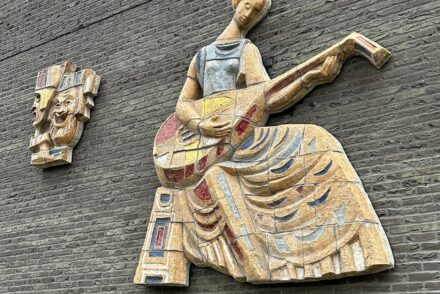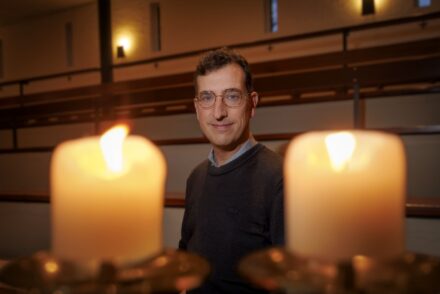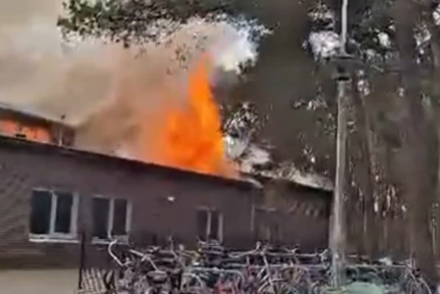Student Hajar Yagkoubi (19) speaks at UN summit in New York
An honor usually reserved for heads of states and other world leaders, Tilburg University student Hajar Yagkoubi is speaking before the United Nations in New York today. “I hope my speech will encourage others to connect with people who are different from them.”
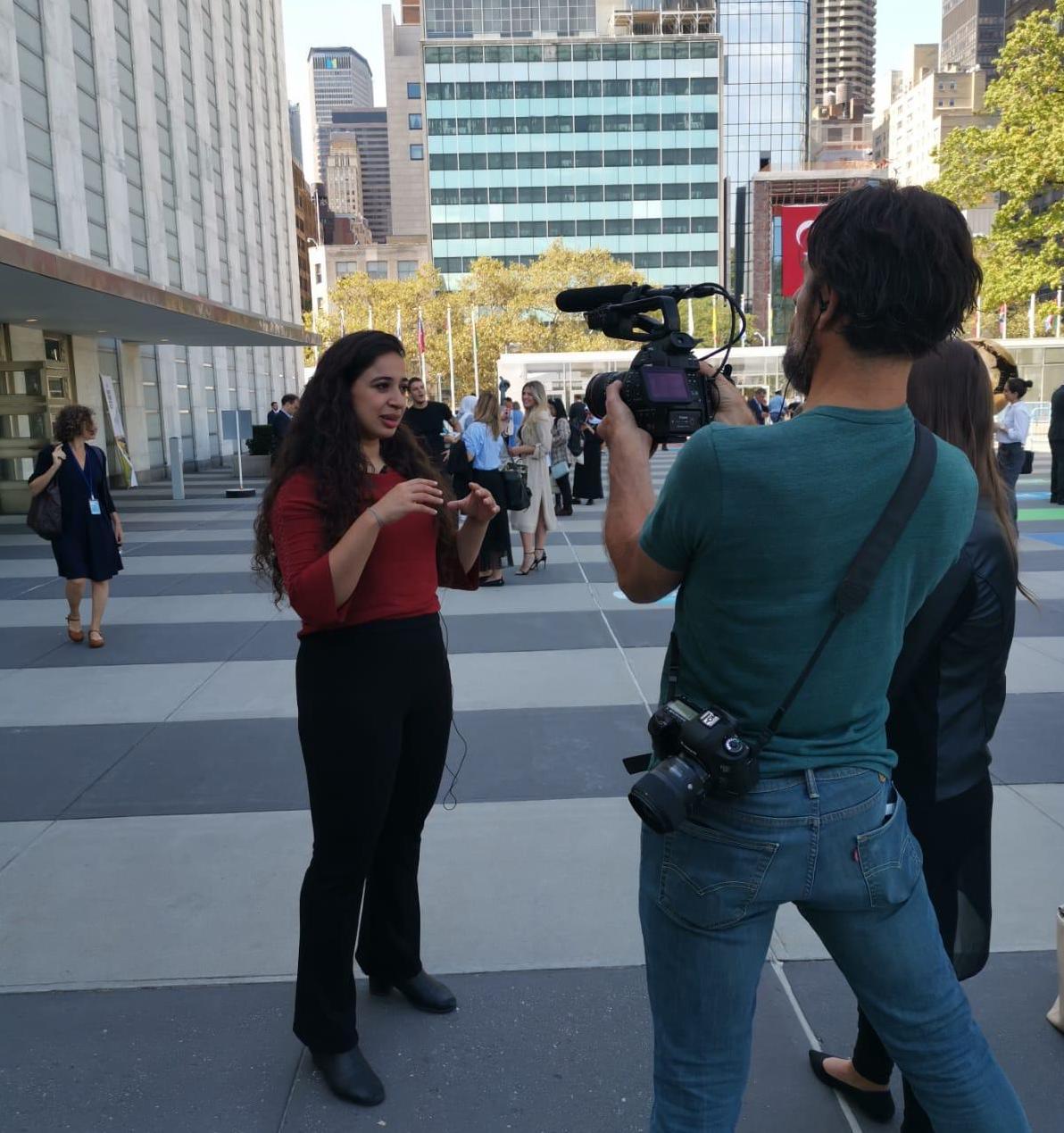
Hajar speaking to reporters at the UN Headquarters
Last week was a pretty remarkable one for second-year IBA student Hajar Yagkoubi. As the Dutch youth representative to the UN on human rights and security, she attended this year’s Climate Summit and General Assembly at the epicenter of world diplomacy: the United Nations Headquarters in New York.
After a week-long stream of inspiring speeches, climate commitments and global headlines made by teenage activist Greta Thunberg, the most momentous part of the annual UN gathering is yet to come for Hajar. Today, on the International Day of Non-Violence, she will address the United Nations on social polarization and ways to combat it.
It’s not every day that a 19-year-old student from Brabant is invited as a speaker at the United Nations. How are you going to use those precious five minutes of speaking time?
“I’m going to talk about ‘us-them’ sentiments in Dutch society. In the past years, sentiments of divisiveness have increased in the Netherlands—between migrants and non-migrants, but also between the rich and the poor, the politically left and the politically right, the high-educated and the low-educated. My speech is about those divides and, more importantly, on how to bridge them.”
What do you want your audience to walk away with?
“I hope my speech will encourage others to seek more interaction with people who are different from them. Nowadays, it’s easy to live in an ‘echo bubble’. Social media algorithms connect us to like-minded people and feed us self-confirming messages. There’s nothing wrong with surrounding ourselves with people who are similar to us, but we shouldn’t lose all exposure to other opinions and contrasting points of view.
“My speech is about us-them sentiments in our society, and how to bridge those divides”
Echo bubbles feed into polarization and us-them sentiments. Perhaps that’s why we find so much hostility in comments sections on social media platforms—because we are no longer used to hearing opinions that don’t chime with our own. We can counter that simply by striking up a conversation with people who are different from ourselves a little more often. I hope I can inspire people to do that, whether it’s online or off.”
How did you prepare for your speech?
“Well, basically, I’ve been preparing for it ever since I became a UN youth representative last year. Over the past year, I’ve visited schools and educational institutions of different levels across the country to talk to kids and young adults about everything that has to do with social polarization in our society. My speech is built on their input. As a youth representative, that’s my main responsibility—to make the voices of young people heard within important national and international discussions.”
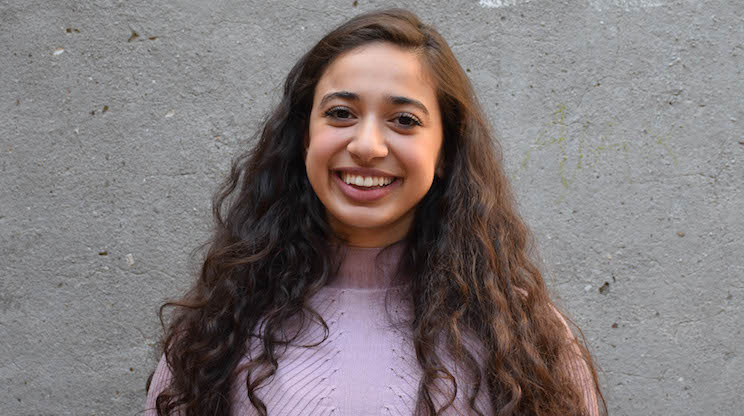
Hajar Yagkoubi
Even with all that inspiration for your speech, you still had to write it. What was your writing process like?
“It involved a lot of re-arranging, deleting and re-writing! I’m pretty happy with it now, but I’m still making some final changes here in New York.”
You arrived in New York two weekends ago, just before the start of the UN Climate Action Summit on 23 September. What do your days in New York typically look like?
“My days here vary so much, so it’s difficult to describe a typical day. I get up early each morning, around six or six-thirty. After breakfast, I head for the United Nations. Once I get inside, which can take quite some time because of all the security checks and protocols, I usually meet up with other youth representatives from different countries to discuss what’s going on that day and whether there are any not-to-miss events or discussion panels that are particularly relevant to young people. We want to make sure that it’s not just elderly adults who are on those discussion panels, but that the youth voice is heard as well. As youth representatives, we also organize our own side events on themes such as the youth voice in politics and intergenerational cooperation, which are attended by diplomats, ministers and state secretaries.
“I attended the speeches of world leaders such as Trump, Macron, Bolsonaro and Boris Johnson”
If I’m not joining a panel discussion or hosting a side event, I attend other side events that I find interesting. For example, I’ve attended side events where Queen Máxima and Bill Gates were speaking. And I also saw the speeches of a few world leaders that I was curious about, such as Trump, Macron, Bolsonaro and Boris Johnson. From early in the morning until late in the evening, there’s so much interesting stuff to do and see. So my days here are long and busy, but really exciting.”
Did you get to see the much-talked-about speech by the 16-year-old Swedish climate activist Greta Thunberg?
“I didn’t see it live, unfortunately, because I was at another event. I watched her speech online afterwards.”
Her critics claim Greta Thunberg is too young to know what she is talking about. As another young speaker, how do you feel about that criticism?
“It’s a shame that so many people focus on Greta’s age or the way she delivered her speech, when we really should be talking about the content of her speech. I think Greta cares deeply about the climate, and she’s not afraid to show that she cares. That takes courage. It’s much easier to put up a wall than it is to show that something emotionally affects you. I admire her for that.”
The climate is the central theme of this year’s UN gathering. You are a UN youth representative on human rights, not on climate change. Can you explain how those two are related?
“Climate change and human rights are very closely connected. A clear example of that is the extreme drought in Africa, which forces African girls and women—who carry the main responsibility for fetching water—to walk for hours before they reach the nearest water source. Because of the drought, fetching water can be a day’s work. This prevents girls and women from going to school or holding a job, which affects their rights and their opportunities tremendously.
“Climate change and human rights are closely connected”
The problem is that some of the world’s biggest polluters, such as the United States, are not taking climate change seriously. In the US, the consequences of climate change are not as evident as in Africa. But in the end, it’s quite simple: climate change is about what happens to the planet, and what happens to the planet determines what happens to the people who are living on it. That’s us. All of us.”





